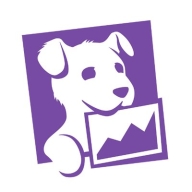

Datadog and Checkmk compete in IT infrastructure monitoring. Datadog may have an advantage in cloud environments due to its extensive integrations and hosted nature.
Features: Datadog excels with hosted services, sharable dashboards, and seamless integrations, providing robust monitoring capabilities that don't require users to maintain the infrastructure. Checkmk is known for its ease of setup and smart automatic discovery, ideal for environments requiring rapid deployment.
Room for Improvement: Datadog needs better customization in dashboard sharing and improved API consistency alongside clearer pricing. Checkmk could enhance integration features and become more user-friendly for newcomers.
Ease of Deployment and Customer Service: Datadog is versatile in cloud deployments, offering proactive customer support, though some users note technical support delays. Checkmk supports primarily on-premises environments, praised for its knowledgeable and immediate customer service response.
Pricing and ROI: Datadog's substantial features come with higher costs, suited for larger environments to justify investment. Checkmk offers affordable, transparent pricing, delivering quick ROI through efficient monitoring capabilities.
| Product | Market Share (%) |
|---|---|
| Datadog | 6.5% |
| Checkmk | 4.1% |
| Other | 89.4% |

| Company Size | Count |
|---|---|
| Small Business | 4 |
| Midsize Enterprise | 3 |
| Large Enterprise | 2 |
| Company Size | Count |
|---|---|
| Small Business | 80 |
| Midsize Enterprise | 46 |
| Large Enterprise | 99 |
Checkmk provides a comprehensive monitoring solution designed to streamline IT infrastructure management with features like auto-discovery, custom checks, and effective alerting.
Checkmk serves as a powerful tool for organizations managing large networks of servers, databases, and network appliances across multiple locations. It simplifies monitoring tasks with features like auto-discovery, custom scripting, and Slack integration. Users benefit from its resource monitoring capabilities and scalability, although there are areas for improvement, such as alert acknowledgment and greater usability. It supports both Linux and Windows environments, enabling effective oversight of IT infrastructure. The growing body of documentation enhances its adaptability in complex settings.
What are the key features of Checkmk?Industries deploying Checkmk frequently utilize it for monitoring IT infrastructure, including servers and network appliances, to manage proactive issue identification and compliance. Companies employ it in the proof of concept phase or for ongoing monitoring, covering hosts, services, and custom application metrics.
Datadog integrates extensive monitoring solutions with features like customizable dashboards and real-time alerting, supporting efficient system management. Its seamless integration capabilities with tools like AWS and Slack make it a critical part of cloud infrastructure monitoring.
Datadog offers centralized logging and monitoring, making troubleshooting fast and efficient. It facilitates performance tracking in cloud environments such as AWS and Azure, utilizing tools like EC2 and APM for service management. Custom metrics and alerts improve the ability to respond to issues swiftly, while real-time tools enhance system responsiveness. However, users express the need for improved query performance, a more intuitive UI, and increased integration capabilities. Concerns about the pricing model's complexity have led to calls for greater transparency and control, and additional advanced customization options are sought. Datadog's implementation requires attention to these aspects, with enhanced documentation and onboarding recommended to reduce the learning curve.
What are Datadog's Key Features?In industries like finance and technology, Datadog is implemented for its monitoring capabilities across cloud architectures. Its ability to aggregate logs and provide a unified view enhances reliability in environments demanding high performance. By leveraging real-time insights and integration with platforms like AWS and Azure, organizations in these sectors efficiently manage their cloud infrastructures, ensuring optimal performance and proactive issue resolution.
We monitor all Cloud Monitoring Software reviews to prevent fraudulent reviews and keep review quality high. We do not post reviews by company employees or direct competitors. We validate each review for authenticity via cross-reference with LinkedIn, and personal follow-up with the reviewer when necessary.